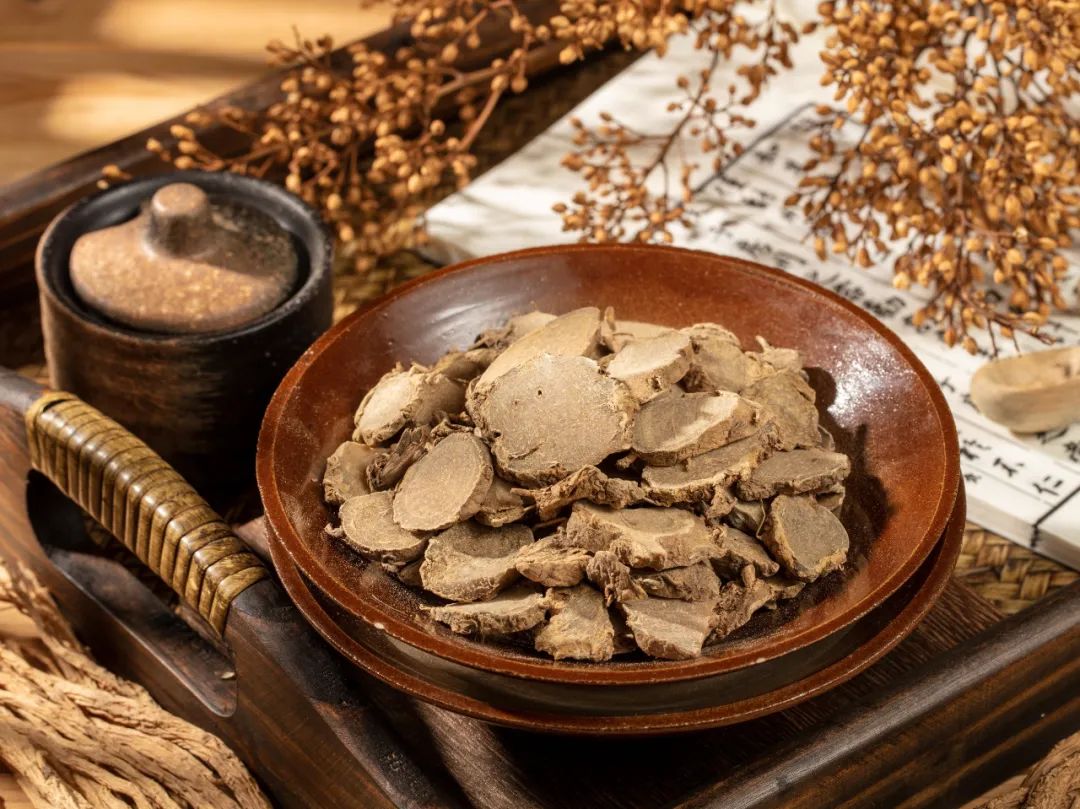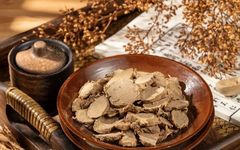
 当归 (Dang Gui)
当归 (Dang Gui)




Angelica Sinensis (当归), also known as Dong Quai, is the dried root of the plant belonging to the Apiaceae family. It is scientifically classified as Angelica sinensis (Oliv.) Diels. This herb typically requires two years of growth before harvesting, which occurs in late autumn. After removing the fibrous roots and soil, the roots are dried by smoking. It can be used raw or after being processed with alcohol. Angelica Sinensis has a long history of medicinal use and is classified as a superior herb in the Shennong Bencao Jing (Shennong’s Classic of Materia Medica). It has been revered as a nourishing tonic due to its blood-nourishing and blood-regulating properties, earning it the title of “the Holy Medicine of Blood.” The medicinal parts of Angelica Sinensis are divided into three sections, each with distinct therapeutic effects: the head of the root is effective for stopping bleeding, the body of the root is good for nourishing blood, and the tail of the root is effective for breaking blood stasis. The whole root can invigorate blood circulation and nourish blood, allowing for selection based on specific medicinal needs.

 Properties and Channels
Properties and Channels
Sweet, pungent, and warm. It enters the Liver, Heart, and Spleen meridians.
Indications and Therapeutic Effects
It nourishes blood, invigorates blood circulation, regulates menstruation, and alleviates pain. It is used for blood deficiency leading to pale complexion, dizziness, palpitations, irregular menstruation, amenorrhea, dysmenorrhea, abdominal pain due to deficiency and cold, rheumatic pain, trauma, carbuncles, and constipation due to dryness of the intestines.
Clinical Applications
1. Blood Deficiency Syndromes
Angelica Sinensis has excellent blood-nourishing properties and is suitable for blood deficiency syndromes, often used in combination with Shu Di Huang (Rehmannia Root), Bai Shao (White Peony Root), and Chuan Xiong (Szechuan Lovage Root). If blood deficiency is accompanied by Qi deficiency, it is often combined with Huang Qi (Astragalus), such as in Dang Gui Bu Xue Tang (Angelica Sinensis and Astragalus Decoction).
2. Irregular Menstruation, Amenorrhea, Dysmenorrhea
Angelica Sinensis can both nourish and invigorate blood, as well as regulate menstruation and alleviate pain, making it a key herb in gynecology. It is particularly suitable for cases of blood deficiency, blood stasis, and disharmony of Qi and blood, leading to irregular menstruation, amenorrhea, and dysmenorrhea. It is often used with Shu Di Huang, Bai Shao, and Chuan Xiong, such as in Si Wu Tang (Four Substance Decoction). If caused by blood stasis, it is often combined with Tao Ren (Peach Kernel) and Hong Hua (Safflower) to promote blood circulation and regulate menstruation. If due to cold stagnation, it is often combined with Rou Gui (Cinnamon) and Ai Ye (Mugwort) to warm the meridians and regulate menstruation.
3. Abdominal Pain due to Deficiency and Cold, Rheumatic Pain, Trauma
Angelica Sinensis is effective in invigorating blood and alleviating pain, warming and dispersing cold stagnation, and nourishing blood, making it suitable for pain caused by blood deficiency and blood stasis with cold stagnation. For treating abdominal pain due to deficiency and cold, it is often used with warming herbs; for rheumatic pain and numbness of the skin, it is often combined with herbs that dispel wind and eliminate dampness; for trauma and swelling with pain, it is often used with herbs that invigorate blood and relieve pain.
4. Carbuncles and Skin Ulcers
Angelica Sinensis can nourish blood and invigorate blood circulation, dispel toxins, and reduce swelling, making it suitable for early-stage carbuncles with redness, swelling, and pain. It is often used with herbs that clear heat, detoxify, and reduce swelling; if treating Qi and blood deficiency with pus formation that does not drain, it is often combined with herbs that tonify Qi and blood, reduce swelling, and promote pus drainage; if treating Qi and blood deficiency with non-healing ulcers, it is often combined with herbs that tonify Qi and blood and promote wound healing.
5. Constipation due to Dryness of the Intestines
Angelica Sinensis can moisten the intestines and promote bowel movements, and is particularly suitable for elderly, weak individuals, and women with blood deficiency leading to dry intestines and constipation, often used with herbs that nourish blood and moisten the intestines.
Dosage and Administration
Decoction, 6-12g (Chinese Pharmacopoeia)
Precautions
Angelica Sinensis is sweet and warm; it is not suitable for those with damp-heat accumulation, lung heat with phlegm-fire, or yin deficiency with yang excess. It should not be used in cases of loose stools or diarrhea.
■ END ■
Source: Pharmacy Department, Qiu Daokun Reviewed by: Information Department
(Some images and text sourced from the internet; please contact the author for removal if there is any infringement)


